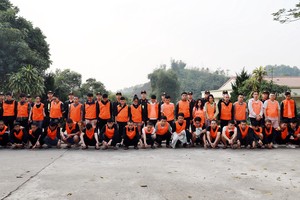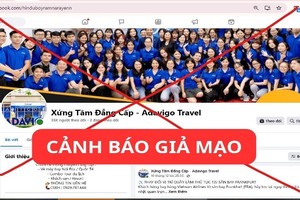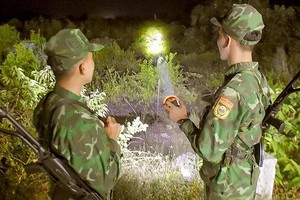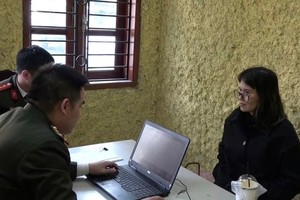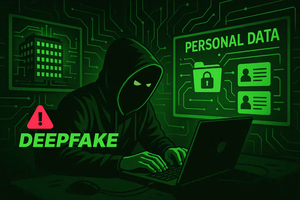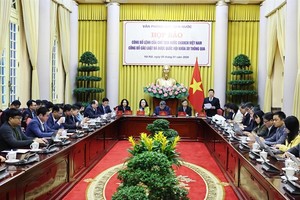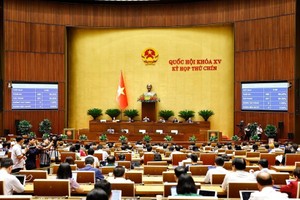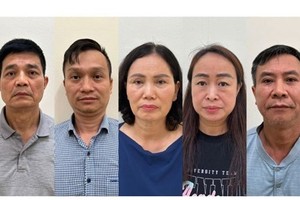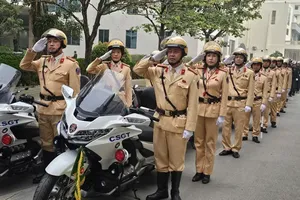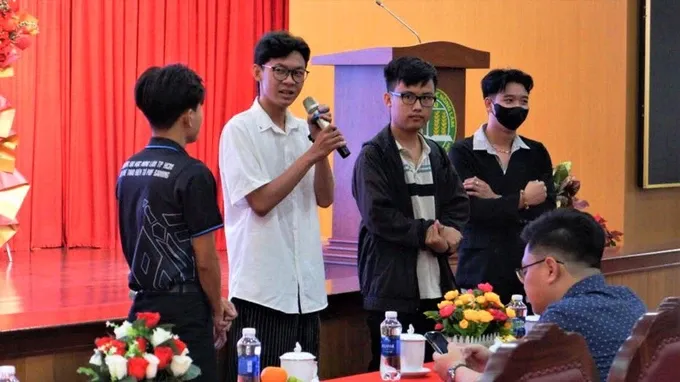
Myriad of deceptive practices
On December 22, HCMC University of Industry issued a campus-wide alert regarding a scam involving individuals impersonating lecturers to collect tuition fees under the guise of facilitating fee reductions. The university unequivocally advised students and parents to adhere strictly to official protocols and explicitly cautioned against transferring tuition fees to any personal bank accounts, affirming that official fee announcements are exclusively disseminated through the university’s official website and social media channels.
Earlier in December 2024, a number of similar warnings were issued by FPT University, the University of Medicine and Pharmacy at Ho Chi Minh City, HCMC University of Transport, and HCMC University of Technology (VNU-HCM), urging students to exercise extreme caution regarding fraudulent scholarship offers and other deceptive solicitations for funds.
FPT University disclosed details of a scam perpetrated on December 15, 2024, involving a fabricated announcement of a Japanese Government Scholarship Program in 2024 offering a limited number of postgraduate, undergraduate, college, and vocational scholarships. The fraudulent announcement stipulated that applicants demonstrate financial capacity by maintaining VND120 million (US$4,700) in their bank accounts to provide a bank statement to the university.
On December 14, 2024, scammers also circulated a forged invitation, purporting to be from the Ministry of Education and Training, inviting students of HCMC University of Technology (VNU-HCM) to an international student exchange event. The university categorically denied the authenticity of this invitation, confirming that no such event was scheduled and that the communication constituted a fraudulent attempt to solicit fees for participation in a non-existent program.
A student from the University of Social Sciences and Humanities (VNU-HCM) recounted a personal experience: “At the end of November, I received a call from someone posing as a police officer. They accused me of being a suspect in a money laundering case, threatening expulsion and even imprisonment. They then demanded a money transfer to avoid prosecution. In a state of panic, I transferred nearly VND50 million ($2,000).” The university’s Student Affairs Department has received similar reports from five other students, each defrauded of tens of millions of VND through similar threats or deceptive overseas study offers, prompting the university to advise these students to file police reports.
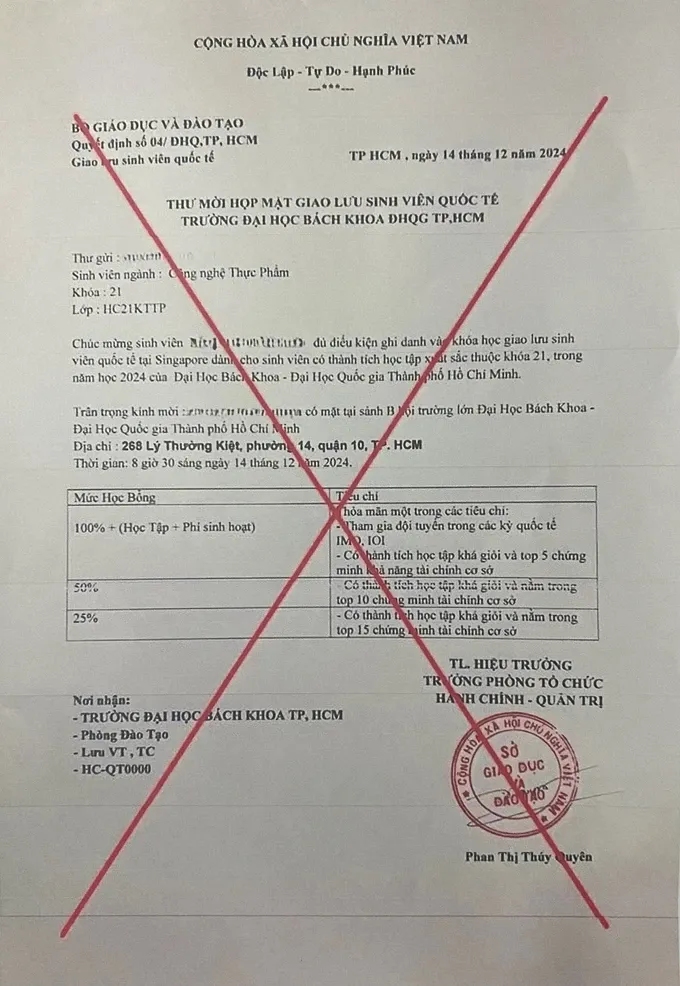
Maintaining vigilance against deception
HCMC University of Technology (VNU-HCM) emphasized the importance of verifying any suspicious information received and avoiding panic. The university reiterated that all legitimate scholarship processes are conducted through secure channels, including official university email and electronic platforms, overseen and regularly updated by designated departments. Students are urged to verify any unusual information through official channels or by contacting the police directly.
Director Pham Thai Son of the Admissions and Communications Center at HCMC University of Industry and Trade highlighted common inconsistencies found in fraudulent scholarship invitations, such as discrepancies between the letterhead (claiming the affiliation of the Education and Training Ministry) and the signature block (featuring a university president or university department head), or the presence of a seal belonging to the HCMC Department of Education and Training.
He emphasized that all information of legitimate scholarships and exchange programs is disseminated through official university websites and internal departmental channels, not directly to individual students, urging vigilance in scrutinizing such communications.
Head Nguyen Trung Nhan of the Student Affairs Department at HCMC University of Industry confirmed receiving numerous student reports of individuals soliciting tuition payments for purported discounts. He stressed the implausibility of such offers, emphasizing that official tuition payment procedures, deadlines, and relevant account details are transparently communicated by the university. He also reiterated that eligibility criteria for fee exemptions and reductions are publicly available, and that lecturers do not facilitate such processes.
According to Head Tran Nam of the Student Affairs Department at the University of Social Sciences and Humanities (VNU-HCM), students should be wary of unfamiliar phone numbers and social media accounts with ambiguous information, remaining vigilant for suspicious details.
He stressed that individuals with no involvement in illegal activities have no cause for concern from law enforcement. He also advised students not to expect unsolicited scholarships or overly generous offers, which are frequently used as bait. He further recommended staying informed about prevalent scams through reputable news sources.
Beyond the content of conversations, other suspicious details include persistent calls, calls originating from noisy environments suggesting call centers, and fraudulent communications employing AI-generated images with unnatural facial movements and distorted audio.
Upon detecting such indicators, students should immediately terminate communication to avoid falling prey to psychological manipulation. In complex situations, students are advised to consult with friends and family for support and objective analysis, avoiding sole reliance on the information provided by potential scammers.
Head Dang Kien Cuong of the Student Affairs Department at Nong Lam University – HCMC emphasized the importance of raising awareness and knowledge about online safety. He stressed the need for students to verify information sources and be skeptical of offers that appear excessively advantageous or effortless. He advocated for online safety training and seminars, urging universities and educational institutions to regularly conduct such sessions. Nong Lam University offers a Psychological Counselling Team, providing students with access to email, phone, and in-person consultations for advice and reporting suspicious activity.
Deputy Director Nguyen Thi Kim Phung of the Admissions and Business Relations Center at the University of Finance and Marketing HCMC outlined crucial principles for online fraud prevention:
- never disclose personal information to strangers;
- avoid befriending or communicating with unknown individuals, particularly those with overly curated online profiles;
- decline invitations to groups with unclear purposes;
- refrain from clicking on links, visiting websites, opening applications, or accessing attachments from unidentified or suspicious sources.
She further emphasized that legitimate law enforcement or financial institutions do not conduct investigations or solicit personal information or payments via phone calls. Consequently, students should never make advance payments, deposits, or transfers to unknown individuals under any circumstances, and should be wary of unsolicited gifts, unrealistic profit promises, or offers of effortless high-paying jobs.


